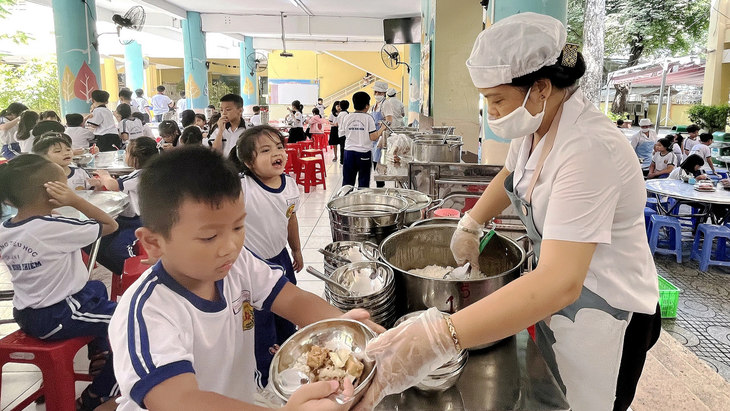Food poisoning from school meals has long been a concern for schools and parents, but there is no truly effective solution to prevent it.

Primary school students in District 1, Ho Chi Minh City eat lunch at school.
Besides, there are many other problems such as children going hungry due to insufficient meals, the cost of a school meal is too high while the quality of the meal and the origin of the food are not guaranteed.
Every now and then, there is an incident that parents discover, such as the image of a child's meager meal being shared on social media. Many parents' complaints when "raiding" the school during their child's meal show that the utensils used for boarding are unhygienic and the food is not hot.
In some cases, food was found to be spoiled due to poor preservation, and even "strange creatures" were found in children's meals...
Previously, many schools had kitchens, organized the import of fresh food and cooked at school. However, this caused problems in terms of food import, preservation and processing, so most schools now choose to contract with outside units.
"It's heartbreaking to pay 70,000 VND/day for meals for your child but he/she is hungry," a parent in Hanoi shared in a parent group after seeing pictures of his/her child's daily meals.
But what worries parents the most is that there is no guarantee of cleanliness and safety standards. A situation where parents can only "live on faith" because there are no necessary mechanisms to monitor and assign clear and appropriate responsibilities to schools.
Some parents said that due to the urgency, they formed a group to petition to participate in a surprise inspection of the school lunch.
This is something that school principals should proactively implement to have different monitoring channels to support schools, minimizing the risk of unsafety and unreasonableness in boarding meals.
However, many schools not only fail to do so, but also prevent parents from requesting supervision.
How to solve the above confusion? Perhaps the first important thing is to determine who is ultimately responsible for the issue of school lunches?
Along with that are convincing sanctions when incidents occur: food poisoning, lack of hygiene and safety, lack of transparency in funding, meal quality...
When having to take on greater responsibility, schools will have to establish strict procedures and regulations, and proactively coordinate with professional agencies and parents to inspect boarding meals.
The problem here is not just checking whether the food is clean and affordable, but also considering the scientific basis of nutrition and suitability for the age of students.
It is time to see this not as a luxury but as a necessity out of responsibility to future generations.
Public opinion calls for a lot of "heart" from schools and food businesses. That is not wrong, but in a society moving towards a more civilized society, it is necessary to first act according to legal regulations, with clear and strict constraints from related parties.
Of course, in an educational environment, an environment where children need to be cared for and protected, "conscientious" behaviors are always supported, trusted, and will be more sustainable than ways of doing things that only pursue profit and benefits...
VINH HA/Youth